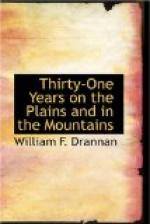Five days’ ride and we were at the place where the emigrants were camped. Another small train had pulled in with them as they were afraid to cross the desert alone.
That night Capt. Mills called the men of the train together to ascertain whether or not they wished to look after their stock, but they did not seem to know themselves what to do. They were quite sure that the Indians had driven the stock south, as they had tracked them some distance in that direction. Capt. Mills asked me what I thought of finding the stock, and I told him that if it was driven south, of which the emigrants seemed quite sure, it was more than likely that the Indians and stock were several hundred miles away, and that it would be next to impossible to get any trace of them, and in my opinion it would be like trying to find a needle in a haystack.
After considering the matter the emigrants concluded that I was right.
Those of them who had lost all their stock were a pitiful sight indeed, women and children were weeping, and particularly those who had lost their husbands and fathers in the fight with the Indians.
There were no women and children killed, as the Indians did not attack the train, being apparently only bent on capturing the horses and cattle. They had killed the guards and also the men that ran out to protect the stock.
One who has never witnessed a like affair can scarcely comprehend the situation of a widow left out there with three or four children in this desolate region, utterly destitute. It was a gloomy situation, indeed, and a sight that would cause the hardest-hearted man to shed tears.
Those who had lost their stock made some kind of arrangements to ride with those that had come later.
The day before starting the emigrants rolled all their wagons together that they did not have teams to haul, also the harness, and in fact everything they could not haul, and burned them, so that the Indians would not derive any benefit from them.
I merely note a few of these facts to give the reader a faint idea of the trials, troubles and hardships that the early settlers of the “wild West” had to pass through, not only in crossing the plains, but, as will be shown later in this book, in many instances after settling in different parts of this western country.
The day before starting, Capt. Mills suggested that as my wound was giving me so much trouble, I should return to headquarters in company with the train of emigrants, and asked how many men I wanted to guard them through. I told him that I would not feel safe with less than twenty men. The Captain thought that twenty would not be sufficient, so he made a detail of twenty-five men and issued rations to last us eight days.
Capt. Mills and the men he had reserved remained in this section of country to guard emigrants that might be traveling westward, as the Indians were now working in this part of the country since our battle with them on the Humboldt.




